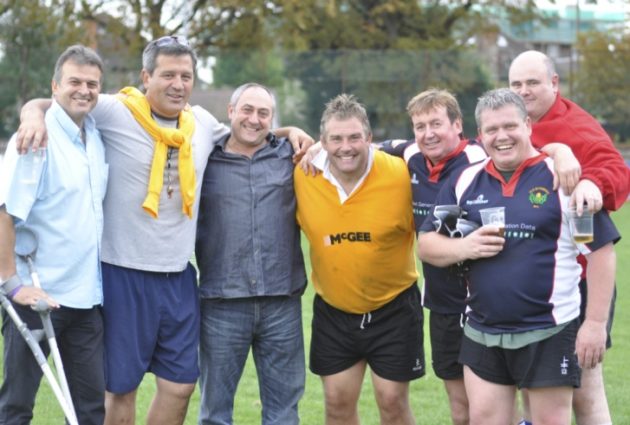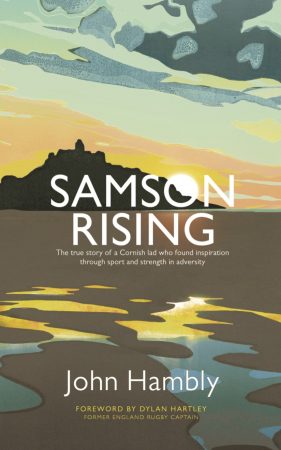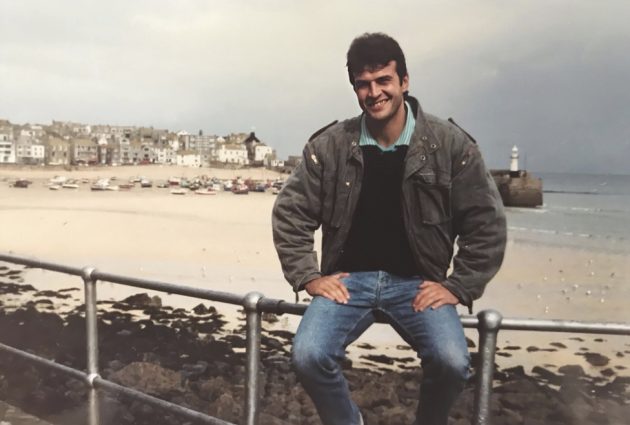John Hambly's rugby career was cut short when he was diagnosed with MS. As his inspiring book Samson Rising relates, the body blow led him to a higher purpose
Samson Rising – the Cornish rugby player who found strength in adversity
Among the likes of Lewis Hamilton, Jimmy Greaves and Rob Baxter on the New Year Honours list was John Hambly OBE. If you were unaware until now or recently of this Cornishman’s rugby exploits with Truro and Old Actonians, you are in good company.
Indeed, his book, Samson Rising, which features his experiences with those two fine clubs, would never have been published had he accepted the advice of those who told him, in good faith, that there would be little interest in the story of someone not remotely ‘famous’.

Thank goodness Hambly ploughed on regardless because Samson Rising, published by United Writers Cornwall, is a marvellous and inspiring read. It will almost certainly make you cry as well as laugh and quite probably make you question your limitations as a human being.
Hambly, 58, has spent more than half his life suffering from multiple sclerosis, yet rose above it so impressively that he founded a facility in Guildford – called the Samson Centre for MS – to benefit those living with this brutal disease.
The MS charity located there has more than 200 members, 11 paid staff and 40-plus volunteers, and provides around 10,000 treatment sessions a year.
It’s a far cry from 2002, when he attended his first meeting of the charity, the MS Therapy Group (Guildford). At that time, the group met in a village hall and had 35 members, around a quarter of whom participated in the weekly exercise class.

Haven: an aerial view of the Samson Centre, where MS patients receive practical and emotional support
Hambly saw the potential for growth and became chairman of the charity the same year. He drove the project to find new premises and set about a mammoth fundraising effort that initially included a target of £250,000 in 18 months.
His rugby mates and business contacts offered incredible support, and he relates some amusing stories of the sneaky tactics employed during Old Actonians dinner auctions to swell the fundraising coffers.
Yet Hambly and others were also rattling tins outside supermarkets, garden centres and sports venues; on one occasion, they amassed more than £1,200 in two-and-a-half hours at Lingfield racecourse. Less successful was a stint in Leatherhead when he was abused by a Big Issue seller whose ‘patch’ he had inadvertently taken.

Rugby camaraderie: Hambly with Zinzan Brooke, Jason Leonard and friends after a charity game in 2007
All this Hambly did while dealing with a disease which he likens to mice nibbling away at the electric cabling of a large house. At the start of one chapter, he details an agonisingly difficult episode with the condition, and only at the end do you realise he was describing the ten minutes it took to get out of bed and stand up.
Hambly is in the remitting/relapsing bracket of MS – so some periods are better than others – but it is a remorseless foe all the same. “Gradually a rolling gait became a limp, a walking stick became crutches, and a self-propelled wheelchair became a motorised one,” he writes.
However, Samson Rising is much, much more than a book about Hambly’s MS and his charitable work. It’s also a superbly written account of a normal life: growing up in Cornwall, leaving home for the first time, the trials and tribulations of student days in Leicester, the anxieties of starting big-city working life as a London building surveyor.

On tour: leading Old Actonians off after a 1990 match against his home club Truro. OAs got a streaky win!
He is a superb storyteller and one of his tales is included at the insistence of his daughter Ellie, such is her fascination with it. It concerns a Friday in May 2005 when Hambly rushed over to inspect an apartment in Holland Park just prior to a bank holiday weekend. Needing to use the toilet at the property, he shut the bathroom door behind him out of habit – only for the doorknob to break when he tried to exit.
He had no phone and no tools, and no one knew he was there! An horrendous weekend of incarceration loomed until he engineered an ingenious escape using sodden shoelaces.

Healing hands: class activity at the Samson Centre. Hambly is vice-chairman of the MS charity it houses
He was tubby as a boy and bullied horrifically – his tormentor was eventually expelled for putting a firework in someone’s mouth and lighting it. Rugby helped give Hambly confidence and later, after this fishing enthusiast left the safety of a job in a field sports shop to venture out in the world, it brought him friendship and memories to treasure forever.
Some of his youthful behaviour, some of the mistakes he made, are things you may well relate to from personal experience. And not just wearing a shiny green New Romantic suit to work in the second week of his surveyor job – his other suit had been ruined by a passing pigeon after Hambly fell asleep during his lunch break in a park!
He says he pondered whether to include the chapter called Together, in which he relates heartbreaking stories of rugby team-mates who have lost children young. In a variant of that, OAs lock Andy Hickman felt unwell during a match on the day of the 1994 England-Wales game and left the field. Before the day was out, he had died of an aortic aneurysm.

Famous day: Hambly captained Old Actonians when they gave London Welsh a fright in the 1990 Middlesex Cup competition
The first cracks in Hambly’s own happy world began in 1991, when he noticed that “something wasn’t right” about a month before he ran the London Marathon. He was a very fit 28-year-old at the time and during the marathon itself was on track to beat 3hr 10min, thus earning extra sponsorship money. Instead, his running gait became lopsided and it took him more than an hour to complete the final three miles.
It wasn’t until 1999, when he was 36, that MS was eventually diagnosed. By that stage Hambly’s wife Marion was expecting the third of their four children. “I wasn’t exactly sitting in a corner rocking back and forth with my head in my hands,” says Hambly, “but the portal to an all-consuming black hole of depression lurked very close.”

Family portrait: Hambly with wife Marion and their four girls in 2017
His response to such cruel misfortune, finding the energy to help so many others, has been awe-inspiring. Dylan Hartley, who provides the foreword, says Hambly possesses mana, a Maori word that in this case reflects “a singular sort of bravery, the moral courage to think of others instead of yourself”.

Enormous credit must also go to Old Actonians, in particular. The club has raised hundreds of thousands of pounds over the past 17 years without ever thinking their own part in creating and running the Samson Centre is done.
Samson Rising is published by United Writers Cornwall, RRP £18.95. A donation of £1 will be made to the Samson Centre for every copy sold.
The publishers have kindly given us six copies to give away – enter our competition for your chance to win a copy of Samson Rising.
Can’t get to the shops? You can download the digital edition of Rugby World straight to your tablet or subscribe to the print edition to get the magazine delivered to your door.
Follow Rugby World on Facebook, Instagram and Twitter.





